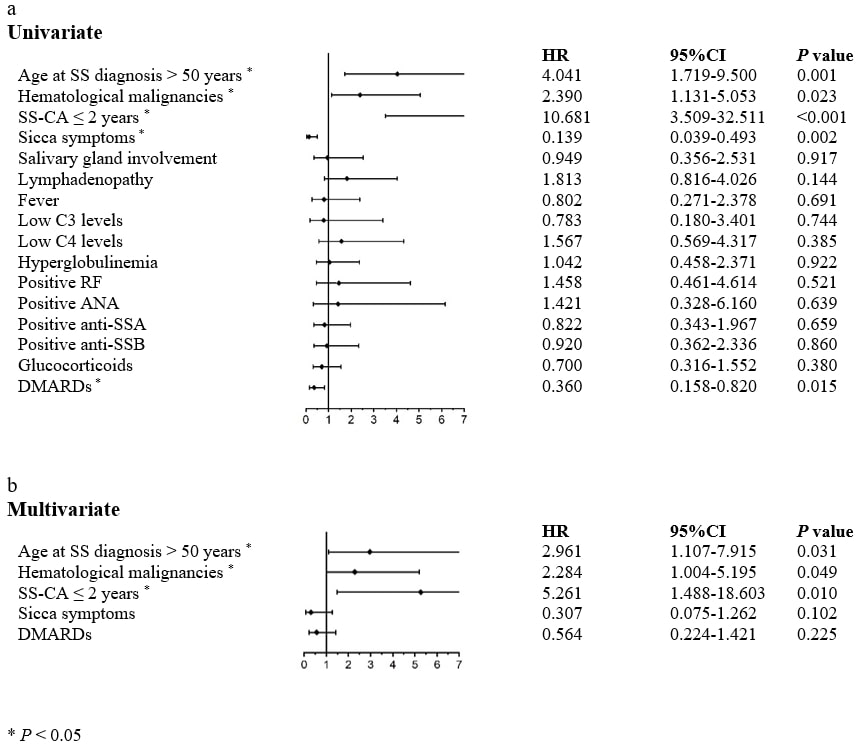Session Information
Session Type: Poster Session B
Session Time: 10:30AM-12:30PM
Background/Purpose: Patients with Sjögren syndrome (SS) have been reported to have a higher risk of cancer than the general population, and malignancy constitutes one of the main causes of death in SS patients. Most studies concerning cancer occurrence after SS (SS-CA) have focused on the incidence risk and risk factors of malignancies, with relatively less attention to prognosis. This study aimed to explore the survival and predictive markers of prognosis in SS-CA patients.
Methods: The medical records of SS-CA patients at the Peking Union Medical College Hospital (PUMCH) between January 2010 and August 2022 were retrieved. Controls were randomly selected from SS patients who visited PUMCH during the same period and had no cancer development up to August 2022. Demographics, clinical manifestations, laboratory findings, treatments, and cancer sites were obtained from the medical records. Telephone follow-ups were conducted to acquire the survival status and complete the missing medical record data. The standard mortality ratio (SMR) was calculated based on the age- and sex-matched mortality data of the general Chinese population in 2020 and the duration of follow-up in our SS-CA cohort. Survival and predictive markers of prognosis were analyzed using Kaplan-Meier curves and Cox regression analyses.
Results: One hundred and fourteen SS-CA patients and 228 controls were included. Non-Hodgkin lymphoma (32, 28.1%) was the most common cancer in SS-CA. With a median follow-up time of 105.1 (57.3-168.0) months, the total standard mortality ratio (SMR) of our SS-CA patients was 2.61 (95% CI 1.73-3.77). Kaplan-Meier survival curve revealed that SS-CA patients had worse outcomes than controls (P=0.010), with 5- and 10-year survival rates of 91.2% and 83.2%, respectively. SS patients with hematological malignancies or with a diagnostic interval between SS and cancer ≤2 years had poorer survival compared to those with solid tumors (P=0.019) or with a diagnostic interval >2 years (P< 0.001). Multivariate Cox regression analysis identified the prognosis-associated factors of SS-CA as age at SS diagnosis >50 years (HR 2.961, 95% CI 1.107-7.915; P=0.031), hematological malignancies (HR 2.284, 95% CI 1.004-5.195; P=0.049), and SS-CA diagnostic interval≤2 years (HR 5.261, 95% CI 1.488-18.603; P=0.010).
Conclusion: Malignant comorbidities constituted a poor prognosis in SS patients, wherein the types of cancer and the chronological interplay between SS and cancer were found to influence survival.
To cite this abstract in AMA style:
Peng Y, Chen J, Ren Y, Yang D, Shen X, Jiang X, Yang H. Survival and Predictive Markers of Prognosis in Patients with Cancer Occurrence After Sjögren Syndrome: A Long-term Observational Study [abstract]. Arthritis Rheumatol. 2024; 76 (suppl 9). https://acrabstracts.org/abstract/survival-and-predictive-markers-of-prognosis-in-patients-with-cancer-occurrence-after-sjogren-syndrome-a-long-term-observational-study/. Accessed .« Back to ACR Convergence 2024
ACR Meeting Abstracts - https://acrabstracts.org/abstract/survival-and-predictive-markers-of-prognosis-in-patients-with-cancer-occurrence-after-sjogren-syndrome-a-long-term-observational-study/


